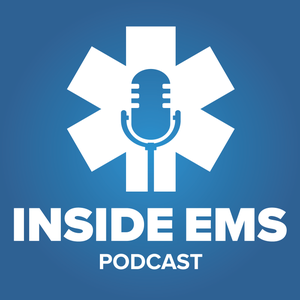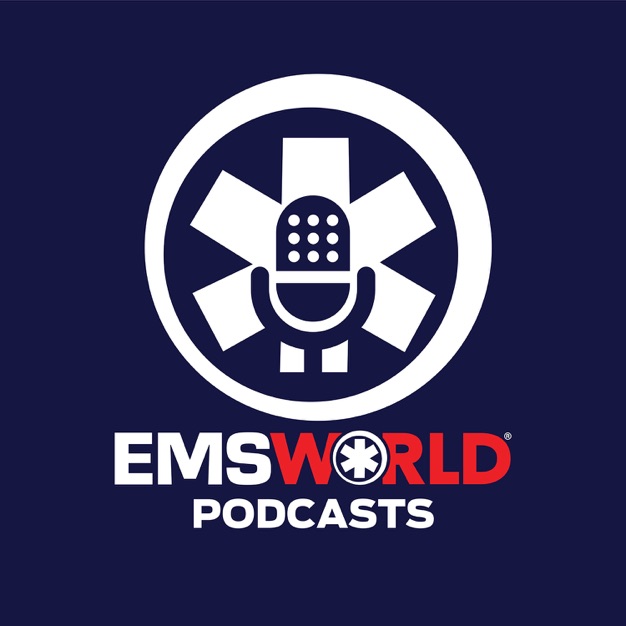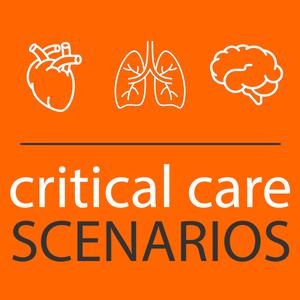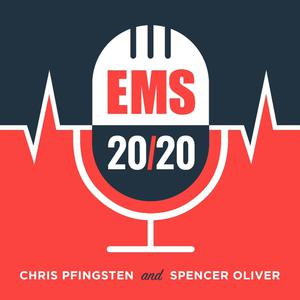
Inside EMS
EMS1 Podcasts
Keeping you on the pulse of what’s happening inside the EMS community. Catch up with Chris Cebollero and Kelly Grayson weekly as they discuss EMS life through good-natured banter and expert perspectives. Their vehicle for delivering the news and know how is that of two medics sitting on the truck between calls. Their mission is to make all listeners, EMS insiders.
- 24 minutes 52 secondsThe science behind shock: Why providers must understand the RAAS
Ever wonder what really happens inside the body during shock? This week, Chris Cebollero and Kelly Grayson dive into the renin angiotensin aldosterone system (RAAS). From vasoconstriction to fluid retention, they break down this complex topic with real-life examples, a sprinkle of humor and practical tips for how EMS providers can apply this knowledge in the field.
Kelly shares the importance of understanding the “why” behind shock presentations, from recognizing when fluids won’t work to knowing when vasopressors are the answer. With anecdotes like treating a sepsis patient on ACE inhibitors and using pulse ox waveforms for clues, this episode blends science with field-tested wisdom. Whether you’re an EMT, paramedic, or just an anatomy nerd, you’ll walk away with a clearer picture of how the RAAS keeps us alive – and how we, as EMS professionals, can work smarter alongside it.
Memorable quotes
-
“It's called, ‘The Renan Angiotensin Aldosterone System – not just a planetary belt in Star Wars’”. — Kelly Grayson
-
“So, the kidneys now say, ‘We're not getting enough blood. Here's this renin that we're gonna send out because we've gotta fix this problem.’ What the body doesn't know is that Chris Cebollero and Kelly Grayson and you are out there trying to fix it. So it’s trying to fix itself.” — Chris Cebollero
Related resources:
ABOUT THE SPONSOR
Whether replacing radio reports, alerting specialty teams, or managing mass casualty incidents, Pulsara simplifies communication. Pulsara scales to meet your dynamic communication needs. From routine patient alerts to managing large-scale emergencies, every responder and clinician connects seamlessly. Familiar yet powerful, Pulsara streamlines your response, from routine transfers to regional disasters. One tool. Every day. Regardless of event. Discover more at Pulsara.com.
RATE & REVIEW
Catch a new episode of the Inside EMS podcast every Friday. Enjoying the show? Contact the Inside EMS team at [email protected] to share ideas, suggestions and feedback, or let us know if you’d like to join us as a guest.
17 January 2025, 6:05 pm -
- 18 minutes 49 seconds‘Be curious, not judgmental’: What Ted Lasso can teach EMS
In this episode of Inside EMS, hosts Chris Cebollero and Kelly Grayson explore leadership insights drawn from a recent post by The Humbled Medic blog, which highlights lessons from the hit Apple TV show “Ted Lasso.” Known for its humor and heart, the show serves as a surprising but fitting blueprint for leadership, especially for EMS educators and professionals.
The hosts discuss the importance of embracing the philosophy “be curious, not judgmental,” a guiding principle that urges EMS providers to set aside assumptions about patients and colleagues. Other takeaways include the value of challenging oneself to grow, the significance of second chances, and the power of building a trusted support system.
From embracing discomfort, to cultivating belief in others and finding small ways to show kindness, the episode encourages EMS professionals to lead with both heart and purpose.
ABOUT THE SPONSOR
Whether replacing radio reports, alerting specialty teams, or managing mass casualty incidents, Pulsara simplifies communication. Pulsara scales to meet your dynamic communication needs. From routine patient alerts to managing large-scale emergencies, every responder and clinician connects seamlessly. Familiar yet powerful, Pulsara streamlines your response, from routine transfers to regional disasters. One tool. Every day. Regardless of event. Discover more at Pulsara.com.RATE & REVIEW
Enjoying the show? Email [email protected] to share ideas, suggestions and feedback, or let us know if you’d like to join us as a guest.
10 January 2025, 4:45 pm - 25 minutes 54 secondsWhen the unthinkable happens: 2024’s most unbelievable EMS calls
This year, EMS brought more than its fair share of jaw-dropping moments, and as we wrap up 2024, we’re revisiting five of the craziest stories that made headlines. From a massive chemical plant fire in Texas prompting a shelter-in-place order, to a sand hole tragedy on a Florida beach, these events highlight the unpredictability of EMS work.
Ever had a crash victim ejected so far from their vehicle, they landed on a roof? That’s exactly what happened in Michigan. Or a tractor-trailer cab dangling precariously off a bridge? Louisville firefighters made a daring rescue of a semi-driver in just such a predicament. And let’s not forget the aquarium at a Texas hospital that literally cushioned the blow of a car crashing into the ER. Turns out, those tropical fish weren’t just for decoration after all.
These stories remind us that no call is ever routine, and the unpredictable nature of EMS keeps us on our toes. It’s also a good reminder to revisit training and be ready for the “what-ifs,” from trench rescues to chemical response protocols.
Quotables
- “In public safety, everybody’s an expert about someone else’s call.”
- “If you work a wreck after midnight and don’t find a drunk, keep looking — someone is missing.”
- “The body can take a crazy amount of trauma and still survive.”
- “All I can think is some hospital administrator somewhere is saying, ‘See? That aquarium was worth it.’”
- “Dark humor isn’t always the best coping mechanism, but it’s how we survive the job.”
Top 5 craziest EMS calls of 2024
- Aquarium likely saved lives when car crashed into Texas ED
- 2 dead, dozens injured in hazmat leak at Texas refinery
- 911 calls from fatal Fla. sand hole collapse released
- Ejected in fiery crash, Mich. driver lands on roof of house
- Dash cam video shows Ky. truck left hanging off bridge after crash
Enjoying the show? Email the Inside EMS team at [email protected] to share ideas, suggestions and feedback, or let us know if you’d like to join us as a guest.
ABOUT THE SPONSOR
Whether replacing radio reports, alerting specialty teams, or managing mass casualty incidents, Pulsara simplifies communication. Pulsara scales to meet your dynamic communication needs. From routine patient alerts to managing large-scale emergencies, every responder and clinician connects seamlessly. Familiar yet powerful, Pulsara streamlines your response, from routine transfers to regional disasters. One tool. Every day. Regardless of event. Discover more at Pulsara.com.20 December 2024, 4:11 pm - 24 minutes 58 secondsPay to stay: Why EMS providers are voting with their feet
EMS pay and retention – or the lack thereof – is at the heart of this week’s episode of Inside EMS. Hosts Chris Cebollero and Kelly Grayson tackle a news item out of Dougherty County, Georgia, where a recent exodus of EMS professionals spurred long-overdue pay raises and bonuses.
The discussion then shifts to Pickens County, Alabama, where a lack of funding led to a total EMS shutdown. Chris and Kelly explore how underfunded systems collapse under the weight of low reimbursement rates, poor public understanding of EMS costs, and systemic inaction until tragedy strikes.
Through real-world examples, the hosts unpack why it’s essential to “vote with your feet” as an EMS professional and how agencies can keep talent by either paying well or fostering loyalty – though they can’t afford to fail at both. If you’ve ever wondered why EMS seems stuck in a financial rut, this episode offers insights that hit close to home.
ABOUT THE SPONSOR
Whether replacing radio reports, alerting specialty teams, or managing mass casualty incidents, Pulsara simplifies communication. Pulsara scales to meet your dynamic communication needs. From routine patient alerts to managing large-scale emergencies, every responder and clinician connects seamlessly. Familiar yet powerful, Pulsara streamlines your response, from routine transfers to regional disasters. One tool. Every day. Regardless of event. Discover more at Pulsara.com.
RATE & REVIEW
Enjoying the show? Contact the Inside EMS team at [email protected] to share ideas, suggestions and feedback, or let us know if you’d like to join us as a guest.
13 December 2024, 6:16 pm - 28 minutes 5 secondsAccountability in action: Building a culture that sticks in EMS
In this week’s episode of the Inside EMS podcast, cohosts Chris Cebollero and Kelly Grayson dive into a vital topic: the culture of accountability in EMS. Sparked by FireRescue1’s Chief Marc Bashoor’s thought-provoking article, "Where is our culture of accountability?", the hosts explore why change is so difficult to embrace, how leadership impacts culture and what steps agencies can take to help foster accountability across an organization. From managing expectations to addressing fairness in discipline, our cohosts discuss the challenges of enforcing standards and avoiding the normalization of deviance. Whether it's implementing safety protocols or shifting organizational norms, this episode unpacks how leaders and teams can work together to inspire meaningful change.
Quotable takeaways
- “The only one who likes change is a wet baby.” — Kelly Grayson
- “If you don’t correct something, that thing becomes the new standard.” — Kelly Grayson
- “Vision is where we’re going; strategy is how we’re going to get there and culture is the behavior of the organization in reaching the vision.” — Chris Cebollero
- “Turnover isn’t the end of the world.” — Kelly Grayson
----more----
ABOUT THE SPONSOR
Whether replacing radio reports, alerting specialty teams or managing mass casualty incidents, Pulsara simplifies communication. Pulsara scales to meet your dynamic communication needs. From routine patient alerts to managing large-scale emergencies, every responder and clinician connects seamlessly. Familiar yet powerful, Pulsara streamlines your response, from routine transfers to regional disasters. One tool. Every day. Regardless of event. Discover more at Pulsara.com.RATE & REVIEW
Enjoying the show? Contact the Inside EMS team at [email protected] to share ideas, suggestions and feedback, or let us know if you’d like to join us as a guest.
29 November 2024, 1:00 pm - 30 minutes 17 secondsMaking every data point count: Strengthening EMS operations through technology
EMS agencies are facing mounting challenges, from staffing shortages and rising operational costs to increasingly complex compliance requirements. However, advanced data systems and integrated technology offer solutions to these persistent issues.
In this episode of Inside EMS, Clinical and Business Consultants Jason Bartholomai and Chuck Sweeney of ZOLL Data Systems discuss how robust EPCR systems and streamlined workflows can reduce inefficiencies, improve patient care and ease the burden on EMS teams.
Here are top takeaways leaders can learn from this episode about overcoming today’s EMS challenges.
1. Staffing shortages: Doing more with lessUse technology to reduce workload inefficiencies and support field personnel.
Staffing shortages are a top concern for EMS leaders nationwide. Long shifts, redundant documentation and poor integration between field and dispatch operations exacerbate the stress on paramedics. EPCR systems can alleviate some of these pressures by:
-
Streamlining documentation with intuitive workflows that reduce time spent on reports
-
Improving coordination between field crews, dispatchers and billing teams through integrated software solutions
-
Enhancing employee satisfaction by minimizing administrative burdens and allowing more focus on patient care and recovery time
By implementing systems that improve efficiency, EMS agencies can help retain personnel and maximize the output of limited resources.
2. Compliance made simpler: Staying ahead of standardsHolistic software ecosystems can simplify compliance and improve data accuracy.
Compliance with NEMSIS standards and other reporting requirements is growing increasingly complex. Leaders must ensure that their systems capture accurate data to meet clinical, operational and legal standards to:
-
Prevent incomplete reports from moving forward
-
Highlight missing critical fields, such as patient signatures or demographic data, which can stall reimbursement
-
Provide real-time feedback for quality improvement (QA/QI)
Integrating compliance directly into workflows ensures fewer errors and smoother billing cycles, saving agencies time and resources.
3. Faster reimbursement through smarter workflowsImproving cash flow starts with high-quality data entry at the source.
EMS leaders often overlook how documentation practices impact financial performance. Efficient EPCR systems improve clean claim rates by:
-
Guiding paramedics to include all required information during documentation
-
Automating processes like importing EKG results and demographic data
-
Flagging incomplete or incorrect entries before claims are submitted
By speeding up documentation and addressing gaps early, EMS agencies can ensure faster reimbursements and predictable cash flow.
4. Breaking down silos: Building an integrated ecosystemAligning workflows across departments enhances efficiency and collaboration.
EMS operations are not limited to field crews. Dispatchers, billers and managers play critical roles in delivering care and sustaining operations. Integrated systems ensure that:
-
Dispatchers, paramedics and billers share a unified platform, fostering communication and reducing friction
-
Teams are trained holistically to understand each other’s roles and responsibilities
-
Operational, clinical and financial data flow seamlessly across departments
Such alignment reduces redundancies, boosts productivity and allows agencies to operate more effectively under tight constraints.
5. Preparing for legal challenges with better documentationAccurate, detailed reports protect EMS providers in legal scenarios.
In EMS, thorough documentation is not just a requirement – it’s a safeguard against legal liability. EPCR systems help paramedics document essential details clearly and accurately, reducing the risk of errors that could be exploited in court. Training crews to use these tools effectively ensures that charts provide a source of truth in any legal or compliance review.
Final thoughtsJason Bartholomew summed it up best: “Doing something is better than doing nothing.” EMS agencies should start small, focusing on one area for improvement, such as data validation or staff training, before expanding into comprehensive ecosystem integration. Chuck Sweeney emphasized the importance of buy-in from all levels, noting that shared understanding and collaboration across departments are critical to long-term success.
By adopting robust technology and fostering teamwork, EMS leaders can tackle the headaches of staffing shortages, compliance demands, and financial uncertainty – all while improving the quality of patient care.
EMS1 is using generative AI to create some content that is edited and fact-checked by our editors.
About the sponsorZOLL Data Systems’ cloud-based solution suite of EMS and Fire solutions covers the scope of your operations, from dispatch to patient care, to incident and operational reporting, to billing. Learn how ZOLL software can help improve clinical, operational and financial performance of your organization at zolldata.com.
Rate & Review the Inside EMS PodcastCatch a new episode of the Inside EMS podcast every Friday on Apple Podcasts, SoundCloud, Amazon Music, Stitcher, Spotify, and RSS feed.
Enjoying the show? Please take a moment to rate and review us on Apple Podcasts. Contact the Inside EMS team at [email protected] to share ideas, suggestions and feedback, or let us know if you’d like to join us as a guest.
21 November 2024, 2:56 pm -
- 26 minutes 22 secondsThe EMS Book Club: 10 texts all paramedics should have on their shelves
This week, Chris Cebollero and Kelly Grayson host a virtual book club as they count down the top 10 essential texts that paramedics should have on their shelves – a mix of useful references, anatomy and physiology deep dives, and heartfelt memoirs that capture the essence of EMS work. From learning resources, to comic relief, there’s something for everyone in this list.
Did our cohosts exclude a favorite EMS-focused book? Send your suggestions to [email protected] for inclusion in a future article.
Memorable quotes-
“I think that a good paramedic is someone who is proficient in their knowledge and their skills, and keeps up to date. That's a good paramedic. A great paramedic adds empathy and compassion to that list. And that's what differentiates the confident ones from the great ones.” — Kelly Grayson
-
“The central message is that Teddy Roosevelt quote: ‘People don't care how much you know, until they know how much you care.’” — Kelly Grayson
Whether replacing radio reports, alerting specialty teams, or managing mass casualty incidents, Pulsara simplifies communication. Pulsara scales to meet your dynamic communication needs. From routine patient alerts to managing large-scale emergencies, every responder and clinician connects seamlessly. Familiar yet powerful, Pulsara streamlines your response, from routine transfers to regional disasters. One tool. Every day. Regardless of event. Discover more at Pulsara.com.
RATE & REVIEWCatch a new episode of the Inside EMS podcast every Friday on Apple Podcasts, SoundCloud, Amazon Music, Stitcher, Spotify, and RSS feed.
Enjoying the show? Contact the Inside EMS team at [email protected] to share ideas, suggestions and feedback, or let us know if you’d like to join us as a guest.
15 November 2024, 4:30 pm -
- 26 minutes 1 second‘Is nasal intubation dead?’: How to think about ‘old school’ EMS training
How old are you in EMS years? Are you using clinical skills that should be put out to pasture? Listen as cohosts Chris Cebollero and Kelly Grayson debate the effectiveness of “retired” EMS skills, like nasal and digital intubation, and whether the value of those skills has held up over time.
Memorable quotes
- “If you’re not proficient with all the tools in your box, what does that say about your training?”
- “I take a lot of pride in having a deep bag of tricks to pull from. And I can't count the number of times that some obscure piece of knowledge, or an assessment or treatment technique worked for me in the field when everyone else had given up or not even considered it.”
----more----
ABOUT THE SPONSOR
Whether replacing radio reports, alerting specialty teams, or managing mass casualty incidents, Pulsara simplifies communication. Pulsara scales to meet your dynamic communication needs. From routine patient alerts to managing large-scale emergencies, every responder and clinician connects seamlessly. Familiar yet powerful, Pulsara streamlines your response, from routine transfers to regional disasters. One tool. Every day. Regardless of event. Discover more at Pulsara.com.ENJOYING THE SHOW?
Contact the Inside EMS team at [email protected] to share ideas, suggestions and feedback, or let us know if you’d like to join us as a guest.8 November 2024, 1:00 pm - 28 minutes 39 secondsThis isn’t you, right?: 10 signs of a bad employee
Last week, Inside EMS cohosts Chris Cebollero and Kelly Grayson laid out the top 10 indications of a bad EMS supervisor (Did you miss it? Catch it here!). This week they’re tackling the top signs of a bad employee, such as poor attendance, lack of initiative and a bad attitude – that’s not you, right? Listen as our duo reflects on each characteristic and where they have seen (or exhibited!) those traits in their career.
Memorable quotes
-
"If you’re emotionally intelligent and honest with yourself, you probably see yourself in some of these things."
-
"It’s not over until the paperwork – or the ambulance – is ready for the next day."
-
"Being disengaged shows up in things you don’t think matter, like documentation and keeping the ambulance stocked."
ABOUT THE SPONSOR
Whether replacing radio reports, alerting specialty teams, or managing mass casualty incidents, Pulsara simplifies communication. Pulsara scales to meet your dynamic communication needs. From routine patient alerts to managing large-scale emergencies, every responder and clinician connects seamlessly. Familiar yet powerful, Pulsara streamlines your response, from routine transfers to regional disasters. One tool. Every day. Regardless of event. Discover more at Pulsara.com.
RATE & REVIEW
Enjoying the show? Send an email to the Inside EMS team at [email protected] to share ideas, suggestions and feedback, or let us know if you’d like to join us as a guest.
1 November 2024, 6:25 pm -
- 29 minutes 55 seconds‘Leadership is an action’: 10 signs of a bad EMS supervisor
The What Paramedics Want in 2024 report, produced by EMS1 and Fitch & Associates, found respondents to the 2024 EMS Trend Survey ranked leadership No. 4 in the critical issues facing EMS today (behind only retention, funding & reimbursement, and career development).
In this episode of Inside EMS, cohosts Chris Cebollero and Kelly Grayson expose the unpleasant side of EMS leadership by naming the top 10 signs of a bad manager. From communication breakdowns to micromanagement nightmares, they explore what makes some managers, well … not so great, while dishing out hard truths about inconsistent leadership, the dangers of favoritism, and the importance of empathy.
Want to know if your manager is part of the problem – or if you're on your way to becoming one? Check it out!
TOP QUOTES
- "Communication is the language of leadership."
- “When you show no concern for the employees, for their interests, you have a breeding ground for developing a toxic work environment.”
- “The true measurement of workforce success is how engaged, satisfied and productive the workforce is – nothing else matters.”
- “You need to care about these people and love them a little bit, as well.”
ABOUT THE SPONSOR
Whether replacing radio reports, alerting specialty teams, or managing mass casualty incidents, Pulsara simplifies communication. Pulsara scales to meet your dynamic communication needs. From routine patient alerts to managing large-scale emergencies, every responder and clinician connects seamlessly. Familiar yet powerful, Pulsara streamlines your response, from routine transfers to regional disasters. One tool. Every day. Regardless of event. Discover more at Pulsara.com.REACH OUT
Enjoying the show? Please contact the Inside EMS team at [email protected] to share ideas, suggestions and feedback, or let us know if you’d like to join us as a guest.25 October 2024, 2:01 pm - 16 minutes 18 secondsCultivating the next generation of EMS
Welcome to this special crossover edition of EMS One Stop and Inside EMS, recorded live at the EMS World Expo 2024 in Las Vegas. Hosted by Rob Lawrence and Chris Cebollero, this episode features insightful discussions with Dr. Ray Barashansky and Tracy Loscar, EMS Deputy Director at Matanuska-Susitna (MatSu) Borough Department of Emergency Services, Alaska.
The episode covers key themes such as leadership development, emotional intelligence in EMS, and the importance of mentorship programs like "Stand and Deliver," aimed at cultivating the next generation of EMS speakers.
Memorable quotes-
“The next generation of EMS leaders is here, and it's our responsibility to pass the torch with the lessons we've learned." — Rob Lawrence
-
“We need to stop staying siloed. Growth happens when we learn from each other’s experiences and different perspectives.” — Chris Cebollero
-
“Designating EMS as an essential service is critical, but without form, function, and funding, it's just words on a page.” — Dr. Ray Barashansky
-
“Stand and Deliver is about giving everyone a chance to step up, present their ideas, and get real-time feedback from experienced national speakers." — Tracy Loscar
-
Leadership Transition in EMS. The influx of new attendees at the Expo reflects the need to develop the next generation of EMS leaders. Rob and Chris highlight the importance of passing the torch to younger EMS professionals.
-
Emotional intelligence in EMS. Dr. Ray Barashansky emphasizes how emotional intelligence impacts supervisors and leaders in EMS. He discusses his presentation on this topic, sharing insights on how emotional intelligence can shape better leaders.
-
Stand and Deliver Program. Tracy Loscar introduces the "Stand and Deliver" initiative, a program that identifies and mentors emerging EMS speakers, offering real-time feedback from national experts.
-
EMS as an essential service. Dr. Barashansky discusses his recent editorial about EMS being recognized as an essential service and the need for formal structure, funding and legislative support to ensure its sustainability.
-
Mentorship and learning from each other. The hosts and guests stress the importance of learning from one another, breaking silos within EMS, and continuously evolving as professionals through shared experiences.
ABOUT THE SPONSOR
Whether replacing radio reports, alerting specialty teams, or managing mass casualty incidents, Pulsara simplifies communication. Pulsara scales to meet your dynamic communication needs. From routine patient alerts to managing large-scale emergencies, every responder and clinician connects seamlessly. Familiar yet powerful, Pulsara streamlines your response, from routine transfers to regional disasters. One tool. Every day. Regardless of event. Discover more at Pulsara.com.
4 October 2024, 7:40 pm -
- More Episodes? Get the App
Your feedback is valuable to us. Should you encounter any bugs, glitches, lack of functionality or other problems, please email us on [email protected] or join Moon.FM Telegram Group where you can talk directly to the dev team who are happy to answer any queries.
 EMS World Podcasts
EMS World Podcasts
 Critical Care Scenarios
Critical Care Scenarios
 EMS 20/20
EMS 20/20
 The FlightBridgeED Podcast
The FlightBridgeED Podcast